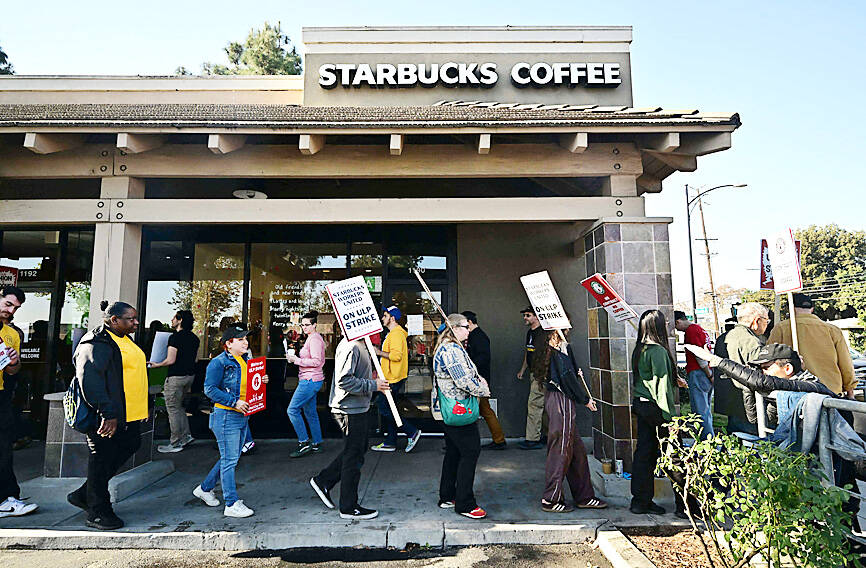A Starbucks Corp strike of unionized baristas has spread to three more cities in the US, disrupting service during the final days of the busy holiday season.
Baristas from Denver, Pittsburgh and Columbus, Ohio, are to join strikes that began on Friday in Chicago, Los Angeles and Seattle, a union statement said.
Starbucks employees from additional cities such as New York, Philadelphia and St. Louis would join each day until Christmas Eve, unless the company honors its February commitment to resolve unfair labor practices, the union added.

Photo: AFP
The disruptions have had “no significant impact” to store operations and only “a small handful” of US stores have been affected, Starbucks spokesperson Phil Gee said.
Starbucks Workers United planned the action to coincide with the holiday season, an important time for the coffee retailer as shoppers treat themselves to lattes while finishing up their shopping.
In addition to beverages, the company sells a large volume of gift cards during the year’s final months.
“We respect our partners’ right to engage in lawful strike activity, and we appreciate the thousands of partners across the country who are continuing to support each other and deliver the Starbucks experience for our customers,” Gee said.
The strikes were sparked by a breakdown in final-stage talks between the union and company leadership, said the union, which represents employees at more than 500 company-operated Starbucks stores around the US.
The coffee chain offered a package that included no immediate pay raises for its members, the union said.
“We remain prepared and available to bargain but need the union to return to the table,” Gee said. “Negotiations require give-and-take and working through proposals, not walking away.”
Workers have said that many stores lack adequate staffing, making it difficult to handle the complicated orders coming through the Starbucks mobile app.
The company operates more than 11,000 stores in the US, employing about 200,000 workers.

The Eurovision Song Contest has seen a surge in punter interest at the bookmakers, becoming a major betting event, experts said ahead of last night’s giant glamfest in Basel. “Eurovision has quietly become one of the biggest betting events of the year,” said Tomi Huttunen, senior manager of the Online Computer Finland (OCS) betting and casino platform. Betting sites have long been used to gauge which way voters might be leaning ahead of the world’s biggest televised live music event. However, bookmakers highlight a huge increase in engagement in recent years — and this year in particular. “We’ve already passed 2023’s total activity and

Nvidia Corp CEO Jensen Huang (黃仁勳) today announced that his company has selected "Beitou Shilin" in Taipei for its new Taiwan office, called Nvidia Constellation, putting an end to months of speculation. Industry sources have said that the tech giant has been eyeing the Beitou Shilin Science Park as the site of its new overseas headquarters, and speculated that the new headquarters would be built on two plots of land designated as "T17" and "T18," which span 3.89 hectares in the park. "I think it's time for us to reveal one of the largest products we've ever built," Huang said near the

China yesterday announced anti-dumping duties as high as 74.9 percent on imports of polyoxymethylene (POM) copolymers, a type of engineering plastic, from Taiwan, the US, the EU and Japan. The Chinese Ministry of Commerce’s findings conclude a probe launched in May last year, shortly after the US sharply increased tariffs on Chinese electric vehicles, computer chips and other imports. POM copolymers can partially replace metals such as copper and zinc, and have various applications, including in auto parts, electronics and medical equipment, the Chinese ministry has said. In January, it said initial investigations had determined that dumping was taking place, and implemented preliminary

Intel Corp yesterday reinforced its determination to strengthen its partnerships with Taiwan’s ecosystem partners including original-electronic-manufacturing (OEM) companies such as Hon Hai Precision Industry Co (鴻海精密) and chipmaker United Microelectronics Corp (UMC, 聯電). “Tonight marks a new beginning. We renew our new partnership with Taiwan ecosystem,” Intel new chief executive officer Tan Lip-bu (陳立武) said at a dinner with representatives from the company’s local partners, celebrating the 40th anniversary of the US chip giant’s presence in Taiwan. Tan took the reins at Intel six weeks ago aiming to reform the chipmaker and revive its past glory. This is the first time Tan